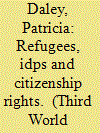| Srl | Item |
| 1 |
ID:
111742


|
|
|
|
|
| Publication |
2012.
|
| Summary/Abstract |
Outside intervention in civil warfare is important for humanitarian, theoretical, and practical policy reasons-since 2006, much of the debate over the war in Iraq has turned on the danger of external intervention if the United States were to withdraw. Yet, the literature on intervention has been compartmented in ways that have made it theoretically incomplete and unsuitable as a guide to policy. We therefore integrate and expand upon the theoretical and empirical work on intervention and apply the results to the policy debate over the US presence in Iraq using a Monte Carlo simulation to build upon the dyadic results of probit analysis. We find that Iraq is, in fact, a significantly intervention-prone conflict in an empirical context; the prospect of a wider, regional war in the event that violence returns in the aftermath of US withdrawal cannot safely be ignored.
|
|
|
|
|
|
|
|
|
|
|
|
|
|
|
|
| 2 |
ID:
123528


|
|
|
|
|
| Publication |
2013.
|
| Summary/Abstract |
Persistent civil warfare has created a crisis of protection for vulnerable refugees/returnees and internally displaced people ( idps ) in the African Great Lakes region. This is in the context of increasing state hostility towards refugees, intensified inter-group competition among citizens, and rising xenophobia towards African 'foreigners'. Humanitarian solutions are often de-contextualised from struggles over entitlements, citizenship and exclusionary practices based on social hierarchies, ethnicity and indigeneity. Hence, they tend to contribute to rather than alleviate the marginality experienced by the displaced. This article argues for further exploration of the processes of identity construction that accompany displacement and humanitarianism and their problematic relationship with sovereignty and citizenship. It suggests that transcending marginality requires greater emphasis on political agency within refugee and idp communities-for their voices to be part of negotiations and conversations on repatriation and integration-in order for them to rejoin the political community.
|
|
|
|
|
|
|
|
|
|
|
|
|
|
|
|